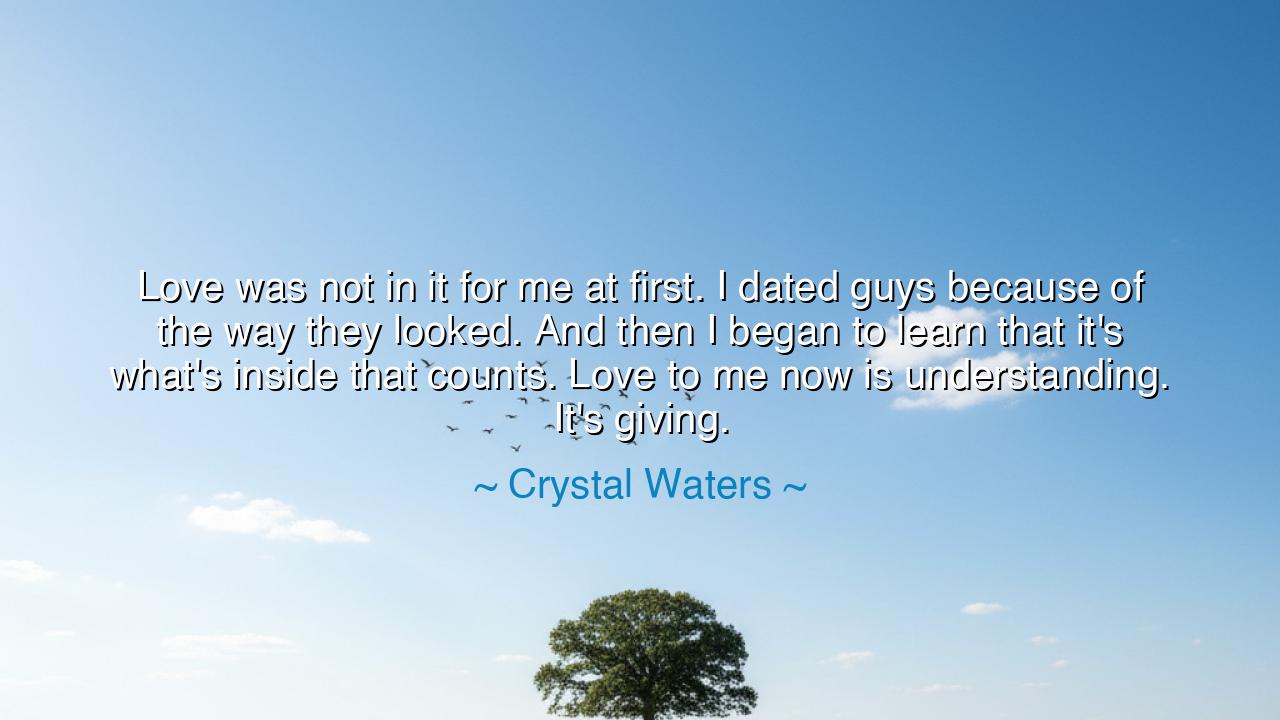
Love was not in it for me at first. I dated guys because of the
Love was not in it for me at first. I dated guys because of the way they looked. And then I began to learn that it's what's inside that counts. Love to me now is understanding. It's giving.






The words of Crystal Waters—“Love was not in it for me at first. I dated guys because of the way they looked. And then I began to learn that it's what's inside that counts. Love to me now is understanding. It's giving”—carry the quiet strength of a soul that has journeyed from illusion to truth. They tell the story of transformation, of the awakening that comes when one realizes that love is not a reflection of beauty seen, but a union of hearts understood. In her words lies an eternal wisdom, known to poets, prophets, and sages throughout the ages: that the eyes may be deceived by the glitter of form, but the heart recognizes truth only in the light of character, compassion, and understanding.
At the dawn of every love, there is enchantment. The ancients called it eros, the fire that stirs the senses and blinds the mind. It is powerful, intoxicating, and yet fleeting. Many, like Crystal, have begun their path through love’s garden guided only by sight—captured by beauty, charmed by elegance, and drawn to the surface glow of another’s form. But soon, the heart learns that such radiance cannot sustain warmth through the winters of life. It is like fire without fuel—bright for a moment, then cold. True love, she discovered, is not found in appearance, but in the soul’s endurance, in two spirits learning to see one another not with the eyes, but with the heart.
This truth is as old as humanity itself. Helen of Troy, whose beauty was said to have launched a thousand ships, brought ruin upon nations because her loveliness blinded men to wisdom. Her story endures not as a tale of love fulfilled, but of desire mistaken for love. In contrast stands the story of Odysseus and Penelope, a love not founded on appearance but on patience, faith, and shared struggle. Though years of war and distance separated them, they remained bound by understanding—a love that gave, that endured. Crystal Waters’ realization belongs to this lineage of wisdom: the understanding that love is not in the fleeting allure of the body, but in the steady grace of giving and the gentleness of comprehension.
When she says, “Love to me now is understanding. It's giving,” she speaks of love not as emotion, but as devotion. Understanding is the root of all compassion; to love is to see beyond the self, to look upon another not as a mirror of our desires, but as a soul with needs, fears, and dreams of its own. And giving—true giving—is not a transaction, but an offering of peace. The ancients called this agape, the divine love that flows without expectation, that strengthens rather than consumes. To understand and to give is to love not for what one receives, but for what one becomes through the act of loving.
In her confession lies humility—the kind born only from experience and introspection. For many must stumble through illusions before they find truth. Youth often mistakes attraction for connection, charm for kindness, beauty for virtue. But as time shapes the heart, we begin to recognize the deeper radiance within another’s spirit—the kind that never fades with age or circumstance. Crystal’s words, therefore, are a testimony to growth: the soul’s passage from infatuation to wisdom, from selfish longing to shared purpose. She reminds us that love, to endure, must evolve from taking to giving, from wanting to understanding.
Consider also the lives of those who built their love upon this foundation. Mahatma Gandhi once said that love, when it is pure, expresses itself in service. He and his wife Kasturba endured poverty, imprisonment, and separation, yet their union was steadfast because it was built not on passion alone, but on shared principles and mutual respect. Their love was a giving love—a force that extended beyond themselves, nourishing not only their bond but the world around them. Such love, born of understanding, transforms both lovers and the lives they touch.
From this, we learn that love is not found—it is cultivated. It grows as understanding grows, it deepens as giving deepens. To truly love is to listen more than you speak, to forgive more than you judge, and to give more than you take. Do not be misled by appearances, for beauty fades, but kindness endures. Seek the one whose soul speaks gently to yours, who meets your storms with patience and your silence with care. Love them not for how they shine in the sunlight, but for how they hold you through the night.
So, my children, remember this: true love is not about possession—it is about presence. The heart that understands gives without fear, and the heart that gives understands without demand. When you love, love like the sun—steady, patient, and selfless. For in the end, love that is only seen will vanish, but love that is felt, that is lived, that is given—will endure beyond time, leaving a warmth that even death cannot extinguish.






AAdministratorAdministrator
Welcome, honored guests. Please leave a comment, we will respond soon